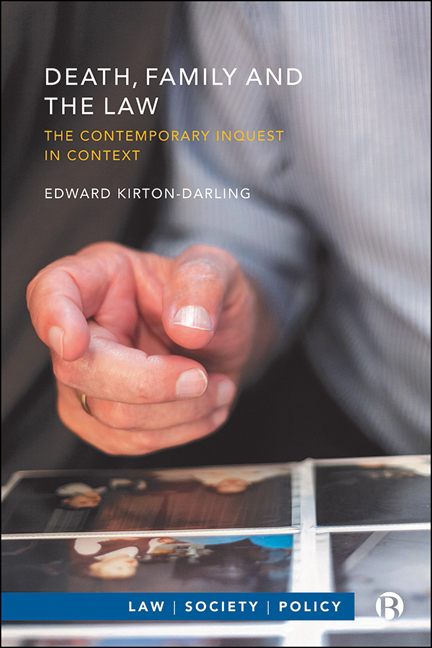Book contents
- Frontmatter
- Contents
- Acknowledgements
- Series Editor’s Preface
- 1 Death, Family and the Law
- 2 Accountability and Authority in the Historical Jurisdiction
- 3 Accountability Reconceived
- 4 First Contact and the Next of Kin
- 5 Dignity, the Family and the Body
- 6 Family in the Driving Seat
- 7 The Public(?) Hearing
- 8 Reimagining the Inquest
- Bibliography
- Index
6 - Family in the Driving Seat
Published online by Cambridge University Press: 08 October 2022
- Frontmatter
- Contents
- Acknowledgements
- Series Editor’s Preface
- 1 Death, Family and the Law
- 2 Accountability and Authority in the Historical Jurisdiction
- 3 Accountability Reconceived
- 4 First Contact and the Next of Kin
- 5 Dignity, the Family and the Body
- 6 Family in the Driving Seat
- 7 The Public(?) Hearing
- 8 Reimagining the Inquest
- Bibliography
- Index
Summary
Introduction
This chapter explores decisions taken (or not taken) in the pre-hearing investigation phase of an inquest. It focuses on the ability of kin to participate in that investigation and, in particular, on two apparently mundane procedural questions which are vital in understanding the contemporary pre-hearing context: the interlinked questions of who is entitled to be an interested person; and what documents they are entitled to receive in the process known as disclosure.
Interested persons are those people entitled to be involved in the investigation, with rights which include the right to be notified about developments in the proceedings, the right to make submissions about the process (including the scope of the inquest – in other words, what issues it will cover), the right to receive disclosure of documents and the right to ask questions of witnesses in any hearings.
The chapter is divided into two substantive parts. In relation to decisions about interested persons, I explore firstly the need for someone to represent a connection to the deceased and the emphasis on implicit decisions about their involvement. I then move on to examine the ways in which, when forced to make a decision, those decisions can be framed as focusing on concerns with kinship and connection (and therefore are focused on seeking to combine forms of accountability), or with formal family ties, but will also involve considerations of purpose and assertions about a natural hierarchy of family.
In the second part, I focus on disclosure and the entitlement to receive documentary evidence as part of the investigation. In particular, I focus on the ways in which decisions about disclosure can again be analysed as based on an understanding of combining accountabilities or a concern to privilege technocratic forms of accountability.
This chapter further emphasizes the importance of not focusing solely on the hearing and its outcome, but also examining systemic decision making in the time before the hearing, and the impact of family participation in those investigations. For example, in one account related to me, an officer described how they had acted on their own initiative without consulting the Coroner in relation to a natural causes death which involved a previous period in detention, seeking additional reports in response to concerns and questions raised by the family.
- Type
- Chapter
- Information
- Death, Family and the LawThe Contemporary Inquest in Context, pp. 122 - 147Publisher: Bristol University PressPrint publication year: 2022



